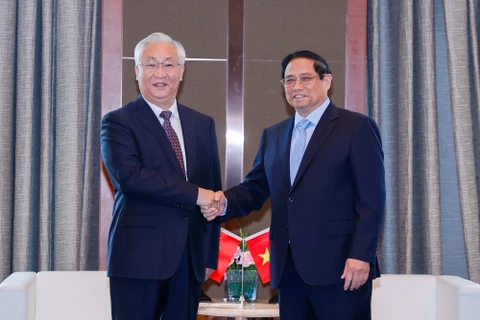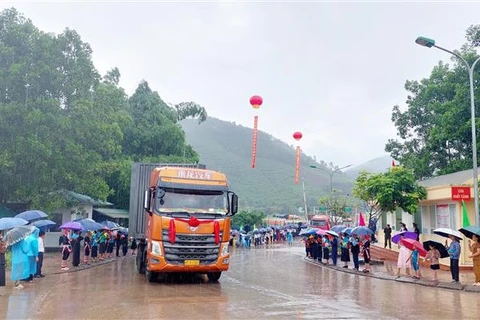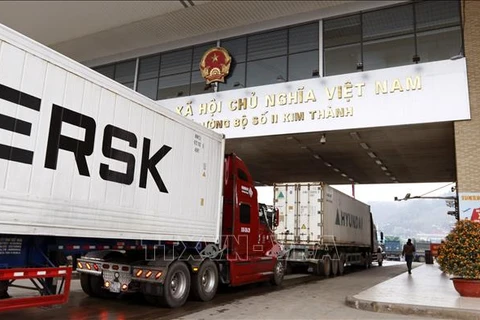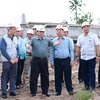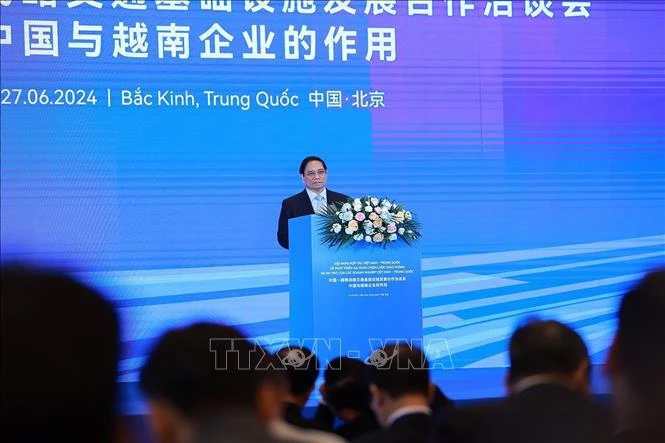
Beijing (VNA) - Vietnamese Prime Minister Pham Minh Chinh and Chinese Vice Premier Zhang Guoqing attended and delivered speeches at a conference on the two countries’ cooperation in transport infrastructure and the role of their businesses, held in Beijing on June 27.
Vice Premier Zhang said that Vietnam and China have both land and sea borders. Traffic between them is connected not only by air and sea but also by road and railway. The two sides have cooperated in several Vietnam's transport projects such as the Cat Linh - Ha Dong metro line in Hanoi.
He welcomed the two countries’ agencies and businesses to jointly promote cooperation in various fields, especially in transport development and connectivity, and stressed the need to mobilise private enterprises to this important task, along with the leading role of State-owned ones.
PM Chinh stressed that developing strategic transport infrastructure connectivity between Vietnam and China is of great significance and an objective need because the two countries are close neighbours bound by shared mountains and rivers. This facilitates people and goods exchanges, and regional and international linkages, as China can go through Vietnam to reach the Association of Southeast Asian Nations (ASEAN), while Vietnam can pass through China to approach Central Asian and Eastern European countries.
With outstanding thinking and vision, China has developed the world's largest, most complete, modern and large-scale road and rail transportation system. Therefore, Vietnam wants to learn from China’s experience and cooperate with the country in the field of strategic transport infrastructure.
However, cooperation results in this field have failed to meet both sides’ potential, strengths, and aspirations, he noted, asking the rail sector to soon implement three railway lines linking Vietnam with China, namely Lao Cai - Hanoi - Hai Phong, Lang Son - Hanoi, and Mong Cai - Ha Long - Hai Phong.
Regarding metro lines, Chinh stressed the need to actively implement projects in Hanoi and Ho Chi Minh City, and encouraged Chinese businesses to invest in the form of public-private partnership (PPP).
He also requested relevant authorities to promote the expansion of air routes between the two countries, increase the frequency of high-demand flights, have more policies to encourage the development of Vietnam - China tourism, and step up the implementation of road projects.

The Vietnamese Government leader suggested the two nations’ businesses further promote cooperation in the form of joint ventures with the principles of harmonious benefits and shared risks, and win-win cooperation. He expressed his hope that in the coming time, there will be a breakthrough in the bilateral relations, particularly in a more substantive and effective manner.
At the conference, the two sides’ ministries, agencies, and businesses shared the situation of each country's transport infrastructure development, as well as good experiences and practical lessons, and suggested directions for cooperation in developing Vietnam's transport infrastructure.
Concluding the conference, PM Chinh said Vietnam needs China’s assistance in preferential loans, and advanced technology to develop transport, especially green transport, green transformation, human resource training, and smart governance.
Calling for Chinese investments, he affirmed that Vietnam is willing to share difficulties with businesses and to do better together in the coming period, thereby contributing to implementing the agreements of the two countries' high-ranking leaders in the spirit of the building of community with shared future, for the interests of the two peoples./.
